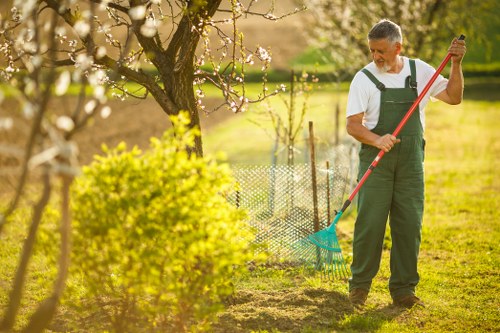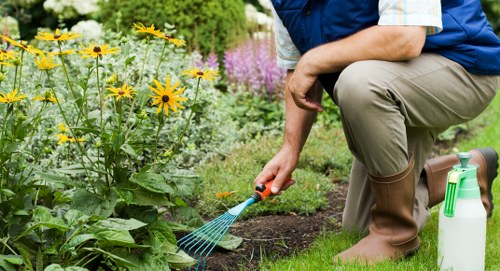Comprehensive Garden Maintenance Services in Brent Cross
Introduction to Garden Maintenance

Maintaining a beautiful garden in Brent Cross requires dedication, knowledge, and the right resources. Whether you’re a seasoned gardener or a novice, understanding the fundamentals of garden upkeep is essential for achieving a vibrant and healthy outdoor space.
In this article, we will explore various aspects of garden maintenance, including seasonal tasks, plant care, landscaping tips, and the benefits of professional gardening services. Our goal is to provide you with actionable insights to keep your garden flourishing year-round.
From soil preparation to pest management, effective garden maintenance involves a combination of routine tasks and strategic planning. Let’s delve into the key components that will help you maintain a stunning garden in Brent Cross.
Seasonal Garden Maintenance

Spring Maintenance
Spring is a critical time for garden maintenance. As the weather warms up, it’s the perfect opportunity to prepare your garden for the growing season ahead.
- Soil Preparation: Test soil pH levels and amend the soil with compost or organic matter to ensure optimal nutrient availability.
- Planting: Plant new specimens, including flowers, shrubs, and trees, to establish a vibrant garden landscape.
- Pruning: Trim dead branches and shape plants to promote healthy growth and improve air circulation.
Summer Maintenance
Summer garden maintenance focuses on sustaining plant health and managing growth during the peak growing season.
- Watering: Ensure consistent watering, especially during dry periods, to prevent plant stress and wilting.
- Weeding: Regularly remove weeds to reduce competition for nutrients and maintain garden aesthetics.
- Mulching: Apply mulch to retain soil moisture, regulate temperature, and suppress weed growth.
Plant Care and Selection

Choosing the Right Plants
Selecting plants that are well-suited to Brent Cross’s climate and soil conditions is fundamental for successful gardening.
Consider factors such as sunlight exposure, water requirements, and growth habits when choosing plants. Opt for native species or those adapted to the local environment to reduce maintenance efforts and enhance plant resilience.
Proper Planting Techniques
Proper planting techniques ensure that your plants establish strong root systems and thrive in their new environment.
- Spacing: Provide adequate spacing between plants to allow for growth and air circulation.
- Depth: Plant seedlings at the appropriate depth to support healthy root development.
- Support Structures: Use stakes or trellises for plants that require support, such as climbing vines or tall shrubs.
Soil Health and Fertilization

Soil Testing and Amendment
Healthy soil is the foundation of a thriving garden. Regular soil testing helps identify nutrient deficiencies and pH imbalances.
Amend the soil with organic matter, such as compost or aged manure, to improve fertility, structure, and drainage. Incorporating organic matter enhances microbial activity and nutrient availability for plants.
Fertilization Strategies
Implementing effective fertilization strategies supports plant growth and productivity throughout the growing season.
- Balanced Fertilizers: Use fertilizers that provide a balanced ratio of essential nutrients, including nitrogen, phosphorus, and potassium.
- Slow-Release Options: Opt for slow-release fertilizers to ensure a steady supply of nutrients over time, reducing the risk of nutrient leaching.
- Organic Fertilizers: Incorporate organic fertilizers to enhance soil health and promote sustainable gardening practices.
Pest and Disease Management

Identifying Common Pests
Effective pest management begins with the early identification of common garden pests in Brent Cross.
Common pests include aphids, slugs, snails, and various beetles. Regularly inspect plants for signs of infestation, such as discoloration, wilting, or visible pests.
Integrated Pest Management (IPM)
Integrated Pest Management is a sustainable approach that combines biological, cultural, and chemical methods to control pests.
- Biological Control: Introduce natural predators, such as ladybugs or beneficial nematodes, to reduce pest populations.
- Cultural Practices: Implement practices like crop rotation and proper sanitation to minimize pest habitats.
- Chemical Controls: Use pesticides as a last resort, opting for environmentally friendly options when necessary.
Landscaping and Design Tips
Creating an Aesthetic Garden
Effective landscaping enhances the visual appeal of your garden and creates a harmonious outdoor environment.
Consider elements such as color coordination, plant height variations, and the use of focal points to design an aesthetically pleasing garden.
Hardscaping Elements
Incorporating hardscaping elements, such as pathways, patios, and garden structures, adds functionality and structure to your garden design.
- Pathways: Design pathways to guide movement and highlight key areas within the garden.
- Water Features: Install water features like fountains or ponds to add a tranquil element to your outdoor space.
- Garden Structures: Use pergolas, arbors, or trellises to provide support for climbing plants and create shaded areas.
Sustainable Landscaping Practices
Adopting sustainable landscaping practices promotes environmental responsibility and resource conservation.
Implement techniques such as rainwater harvesting, xeriscaping, and the use of native plants to reduce water usage and enhance biodiversity.
The Benefits of Professional Garden Maintenance
Expertise and Knowledge
Professional garden maintenance services bring specialized expertise and knowledge to ensure your garden thrives.
Trained horticulturists understand the specific needs of various plants and can provide tailored care to optimize growth and health.
Time and Convenience
Maintaining a garden requires significant time and effort. Hiring professionals allows you to enjoy a beautiful garden without the associated workload.
- Regular Maintenance: Professionals schedule regular visits to perform essential tasks such as pruning, mowing, and fertilizing.
- Emergency Support: Access to timely assistance in case of unexpected issues, such as pest infestations or plant diseases.
- Customized Services: Tailored maintenance plans that align with your garden’s unique requirements and your personal preferences.
Enhanced Property Value
A well-maintained garden enhances the curb appeal and overall value of your property.
Investing in professional garden maintenance can lead to long-term benefits, including increased property worth and a more enjoyable living environment.
Choosing the Right Garden Maintenance Service in Brent Cross
Factors to Consider
Selecting the right garden maintenance service involves evaluating several key factors to ensure you receive quality care.
- Experience: Look for companies with a proven track record and extensive experience in garden maintenance.
- Services Offered: Ensure the service provider offers a comprehensive range of services that meet your garden’s needs.
- Customer Reviews: Read testimonials and reviews to gauge customer satisfaction and service reliability.
- Pricing: Compare pricing structures to find a service that offers good value without compromising on quality.
Consultation and Assessment
Many professional services offer a consultation or assessment to evaluate your garden’s current condition and discuss your maintenance goals.
Take advantage of these consultations to ask questions, express your preferences, and ensure the service provider understands your vision for your garden.
DIY Garden Maintenance Tips
Basic Tools and Equipment
Even if you prefer to maintain your garden yourself, having the right tools and equipment is essential for effective upkeep.
- Pruning Shears: For trimming and shaping plants.
- Garden Fork: For aerating soil and removing weeds.
- Watering Can or Hose: To ensure plants receive adequate hydration.
- Mulch: To retain soil moisture and suppress weed growth.
Time Management
Organize your garden maintenance tasks by creating a schedule that aligns with seasonal needs and your personal availability.
Prioritize tasks based on urgency and impact, ensuring that critical maintenance activities are addressed promptly.
Continuous Learning
Stay informed about best practices in gardening by reading books, attending workshops, and following reputable gardening blogs.
Continuous learning equips you with the knowledge to tackle gardening challenges and improve your maintenance techniques.
Conclusion
Effective garden maintenance in Brent Cross combines strategic planning, regular care, and a deep understanding of plant needs. Whether you choose to maintain your garden yourself or enlist the help of professional services, the key to a thriving garden lies in consistent effort and informed decision-making.
By implementing the tips and strategies outlined in this article, you can create and sustain a beautiful, healthy garden that enhances your outdoor living space and brings joy for years to come.
Contact us today to learn more about our comprehensive garden maintenance services and transform your garden into a stunning oasis.
